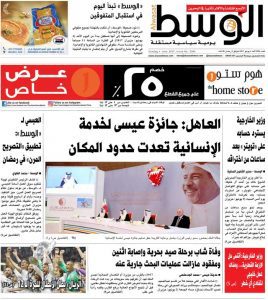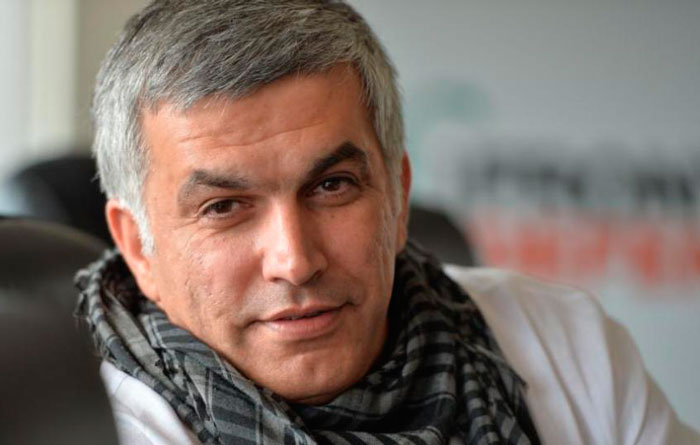8 Jun 2017 | Bahrain, Bahrain Letters, Campaigns, Statements
[vc_row][vc_column][vc_column_text]

Bahrain suspended independent newspaper Al Wasat.
Index on Censorship, other international press freedom organisations and local Bahraini groups are among fifteen campaigners who today raised alarm over the suspension of Bahrain‘s only independent newspaper, Al Wasat, which has been barred from publishing for four days now. The nine rights groups which today wrote letters addressed to ten countries including the UK, state Bahrain is “effectively silencing the media in Bahrain and violating the right to freedom of expression.”
We are writing to urge your government to call on Bahrain to end the arbitrary suspension of Al Wasat newspaper. The Ministry of Information Affairs suspended Al Wasat, the only independent newspaper in Bahrain, on 4 June 2017, effectively silencing the media in Bahrain and violating the right to freedom of expression. The newspaper’s suspension comes after an escalation of reprisals against civil society, and the killing of five protesters by Bahraini police in May.
Al Wasat’s suspension is the latest in a recent spate of reprisals against independent media and civil society actors, including journalists, writers, and human rights defenders. In this context, journalists in Bahrain have expressed to NGOs serious concerns that the newspaper will not be allowed to resume publication.
The suspension comes days after the decision to dissolve Wa’ad, the last major opposition party on 31 May and the raid on Duraz village on 23 May, when 5 protesters were killed by Bahraini police and 286 arrested in the deadliest policing incident in King Hamad’s reign. Human rights defenders have also been subjected to harassment, torture and sexual abuse in the past weeks, according to Amnesty International.
The Bahrain News Agency reported “The Ministry of Information Affairs suspended Al Wasat newspaper until further notice following its recurrent violation of the law and spreading what would stir divisions within the community and undermine the Kingdom of Bahrain’s relations with other countries.” This accusation relates to an editorial about ongoing protests in Al-Hoceima, Morocco. Prior to the suspension of Al Wasat, Bahrain was already counted among the 20 most restrictive countries for press globally, with Reporters Without Borders ranking Bahrain as 164 out of 180 countries in its World Press Freedom Index.
Bahrain’s print media consists of five major Arabic-language daily newspapers. Of these, four are strongly pro-government and are owned by figures associated with the government. Al Wasat is the exception. Established in 2002 during a period of reforms, Al Wasat takes a critical editorial line and is financially independent of the state. Its editor Mansoor Al-Jamri is winner of the CPJ International Press Freedom Award in 2011 and winner of the Peace Through Media Award 2012.
It is not the first time that Al Wasat has been suspended. In January 2017, the newspaper was barred for two days from publishing online, though the print version was allowed, following a front-page story on the executions of three individuals. All three individuals were torture victims who had been sentenced to death following unfair trials. The Office of the United Nations High Commissioner for Human Rights said it was “appalled” by the executions. In August 2015, the newspaper was shut down for two days, allegedly because they did not refer to Bahraini casualties in Yemen as “martyrs”. In April 2011, in the middle of the March-June 2011 State of Emergency, the government suspended Al Wasat for one day. Karim Al-Fakhrawi, a co-founder of Al Wasat, was arrested on 2 April 2011 and tortured to death in police custody.
The suspension of Al Wasat muzzles the media, unduly restricting the right to freedom of expression and opinion. As the only independent newspaper in Bahrain, its suspension removes a key voice for public discourse and denies the public the right to access information and diverse views. In the context of current, severe human rights violations occurring in Bahrain, calls for the resumption of the only independent newspaper and the respect for freedom of expression and opinion urgently need to be heard and acted on. We, the undersigned, urge your government to publicly call on the Government of Bahrain to allow Al Wasat to resume publication immediately.
Yours sincerely,
Americans for Democracy & Human Rights in Bahrain
ARTICLE 19
Bahrain Center for Human Rights
Bahrain Institute for Rights and Democracy
Committee to Protect Journalists
English PEN
European Centre for Democracy and Human Rights
French PEN Club
Gulf Center for Human Rights
Index on Censorship
Norwegian PEN
PEN International
Project on Middle East Democracy
Reporters Without Borders
Signing as an individual:
Dr. David Andrew Weinberg
Senior Fellow
Foundation for Defense of Democracies[/vc_column_text][/vc_column][/vc_row][vc_row][vc_column][vc_basic_grid post_type=”post” max_items=”12″ style=”load-more” items_per_page=”4″ element_width=”6″ grid_id=”vc_gid:1496910031018-0b3e663a-8fff-7″ taxonomies=”716″][/vc_column][/vc_row]
30 May 2017 | Bahrain, Bahrain News, News and features
[vc_row][vc_column][vc_column_text]
Today the trial of Bahraini human rights activist Nabeel Rajab has been pushed back yet again, this time until 12 June 2017. His next trial date will take place just one day shy of a year since he was detained.
The fifty-four-year-old Rajab is currently detained in Kalaa Hospital following surgical complications from a procedure on 5 April. He has spent most of the past year in solitary confinement, resulting in a deterioration of his health.
Sayed Ahmed Alwadaei, director of advocacy Bahrain Institute for Rights and Democracy, said: “Today’s mock trial, in which Nabeel is punished for speaking the truth, shows how desperate Bahrain’s rulers are to silence and punish those who dare to expose the truth. The authorities have treated him in a degrading way for the past year and for what. This would not happen without the green-light from its allies Washington and London. This disastrous policy must be overturned.”
Rajab was jailed on 13 June 2016 for exposing human rights abuses in Bahrain, insulting Saudi Arabia and spreading “rumours and false news”. In September 2016, he published a letter in the New York Times highlighting the fact that journalists and NGO’s cannot enter Bahrain. After his letter was published, he was accused of “false news and statements and malicious rumours that undermine the prestige of the kingdom”.
Rajab’s trial on 12 June will address the accusation of spreading false news that journalists and NGO’s are being barred from the country. Another trial, which has been postponed 13 times, is scheduled for 14 June. It will address charges on his criticism of Bahrain’s capitol’s role in the military campaign against Yemen. If convicted Rajab could face 18 years in prison.[/vc_column_text][/vc_column][/vc_row][vc_row][vc_column][vc_basic_grid post_type=”post” max_items=”4″ element_width=”6″ grid_id=”vc_gid:1496328210946-80160fea-3861-4″ taxonomies=”3368″][/vc_column][/vc_row]
22 May 2017 | Bahrain, Bahrain Letters, Campaigns -- Featured, Statements
[vc_row][vc_column][vc_column_text]

Human rights activist Nabeel Rajab has been subjected to ongoing judicial harassment. He was the recipient of a 2012 Freedom of Expression Award for his work with the Bahrain Center for Human Rights.
Dear Nabeel
Though you are hundreds of miles from us, caught in Bahrain’s nightmarish justice system, know that we are with you in solidarity. Though we do not feel the pain of your mistreatment in solitary confinement, know that your message of hope and peaceful change for Bahrain still resonates across the miles.
It’s not so long ago that the heady days of 2001 made it seem that all was about to change for Bahrain. The disappointments that followed didn’t daunt you. You and your allies spoke out for democracy and for human rights. When it seemed that Bahrain’s moment came again in 2011, you were there speaking a message of non-violent reform.
We know that your time will come again. No matter how hard they push to silence you, they cannot stop your thoughts. They cannot crush your spirit. They cannot convince us that opinions are a crime.
We are here. We are watching. We are listening. We are speaking. We are with you.
The staff at Index on Censorship
—–
Nabeel Rajab is a well-regarded advocate of non-violent reform of Bahrain’s government. The target of an ongoing campaign of suppression of dissident voices in the country, Rajab has been repeatedly charged for critical statements about the Bahraini government.
“The time has come for Bahrain to end this charade. Nabeel has committed no crime. The cases against him make a mockery of the so-called Bahraini justice system, which has the thinnest veneer of fairness. We, once again, call on the government of Bahrain to release Nabeel, all prisoners of conscience and respect the fundamental right to freedom of expression,” Jodie Ginsberg, CEO of Index on Censorship, said.
After being arrested on 13 June 2016 on charges of spreading “rumours and false news” and tweeting about the war in Yemen, Rajab’s two trials have been postponed over ten times in total. He has now spent nearly a year straight in detention, most of which has been in solitary confinement, contributing to a string of serious medical issues including bleeding ulcers.
The treatment of Rajab, who could face up to 18 years in prison if he is convicted in both cases, has been criticised by human rights activists and organisations over the last year. On 12 May 2017, the United Nations Torture Committee released a statement strongly criticising Bahrain’s history of torture as well as urging them to “put an end to the solitary confinement of Mr. Nabeel Rajab and ensure that he is provided with adequate medical assistance and redress”.
It continued: “The Committee is deeply concerned by reports that numerous persons who were deprived of their liberty have been subjected to torture or ill-treatment. It is particularly concerned about the situation of Messrs. Abdulhadi Al-Khawaja, Naji Fateel, Nabeel Rajab, Abduljalil Al-Singace, Hussain Jawad, Abdulwahab Hussain, in particular with regard to their access to medical care.”
Among the “evidence” against Rajab is this 2015 tweet by Index on Censorship that was retweeted by a Twitter account (@NabeelRajab) that is not controlled by Rajab.
What can you do to help?
Detained by the Bahraini government, Rajab needs you to use your voice. Speak out in support of free speech and human rights.
- Tweet and Facebook a statement of solidarity using #IamNabeelRajab.
- Call on your nation’s leaders to pressure Bahrain to respect freedom of expression and #FreeNabeel.
- Retweet the above “criminal” tweet
[/vc_column_text][/vc_column][/vc_row][vc_row][vc_column][vc_basic_grid post_type=”post” max_items=”12″ style=”load-more” items_per_page=”4″ element_width=”6″ grid_id=”vc_gid:1495450775306-1634312c-6588-6″ taxonomies=”3368, 716″][/vc_column][/vc_row]
17 May 2017 | Bahrain, Bahrain News, Middle East and North Africa, News and features
[vc_row][vc_column][vc_column_text]

Bahraini human rights defender Nabeel Rajab (Photo: The Bahrain Institute for Rights and Democracy)
On Tuesday the detention of human rights activist Nabeel Rajab was extended once again when Bahraini courts denied his request for bail and postponed the first of his two trials until 30 May.
Rajab, whose second trial was scheduled for today, was unable to appear in court due to deteriorating health, resulting in him being taken to a hospital.
After being arrested on 13 June 2016 on charges of spreading “rumours and false news” and tweeting about the war in Yemen, Rajab’s two trials have been postponed over ten times in total. He has now spent nearly a year straight in detention, most of which has been in solitary confinement, contributing to a string of serious medical issues including bleeding ulcers.
The treatment of Rajab, who could face up to 18 years in prison if he is convicted in both cases, has been criticised by human rights activists over the last year. On 12 May 2017, the United Nations Torture Committee released a statement strongly criticising Bahrain’s history of torture as well as urging them to “put an end to the solitary confinement of Mr. Nabeel Rajab and ensure that he is provided with adequate medical assistance and redress”.
It continued: “The Committee is deeply concerned by reports that numerous persons who were deprived of their liberty have been subjected to torture or ill-treatment. It is particularly concerned about the situation of Messrs. Abdulhadi Al-Khawaja, Naji Fateel, Nabeel Rajab, Abduljalil Al-Singace, Hussain Jawad, Abdulwahab Hussain, in particular with regard to their access to medical care.”[/vc_column_text][/vc_column][/vc_row][vc_row][vc_column][vc_basic_grid post_type=”post” max_items=”4″ element_width=”6″ grid_id=”vc_gid:1495019195784-ddbc73bc-d6fb-3″ taxonomies=”716″][/vc_column][/vc_row]




